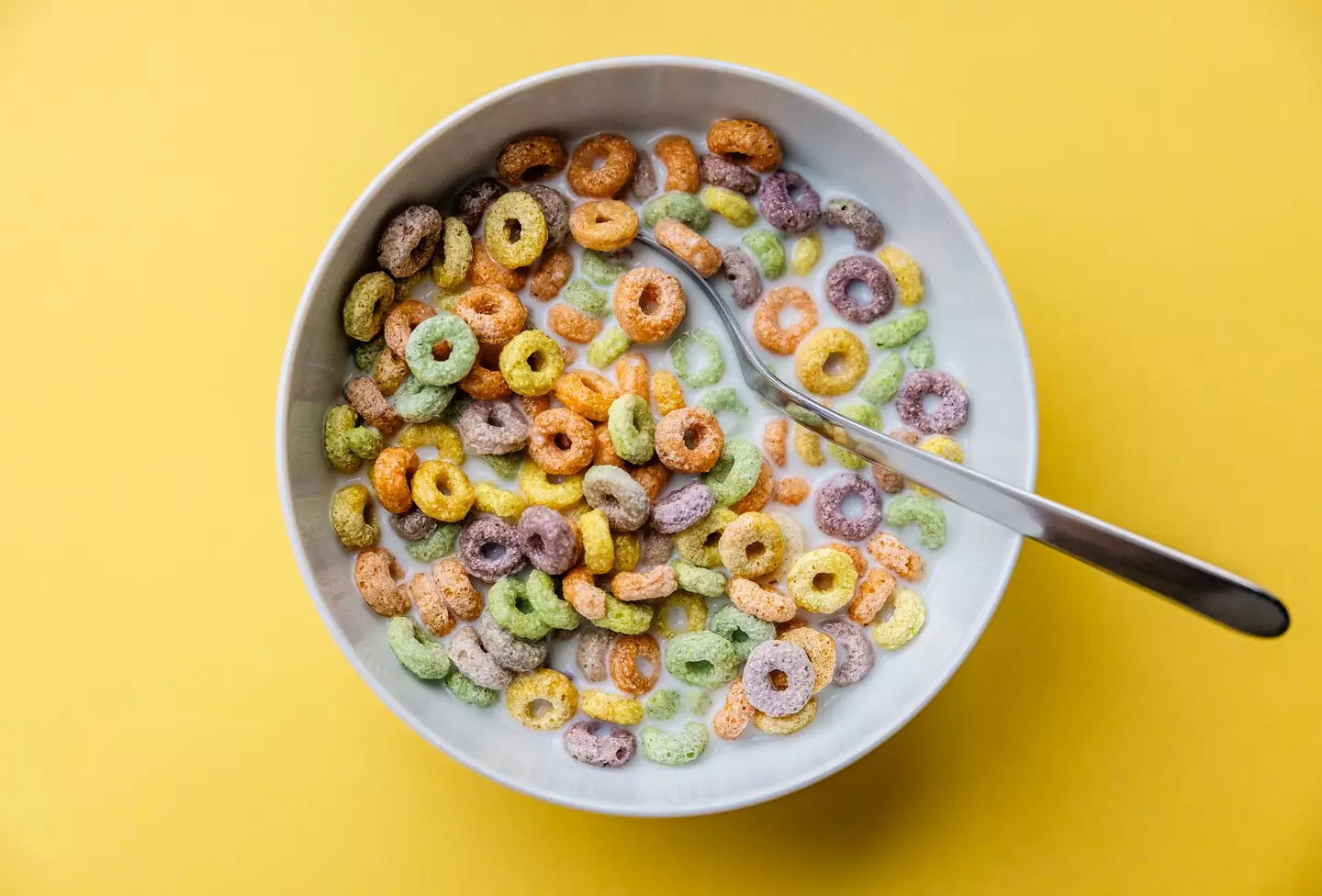If you have ever heard of that saying that ‘it’s in what you eat’, then you’ll know that no truer words have been said.
Not only is food essential for living, giving your body the energy and nutrients it needs to survive, but it can also aid in health problems, as well as making you look and feel younger.
According to a new study, eating this list of foods can potentially slow down your biological aging process.
So, if you’re wondering what the difference between your real age and your biological age, read closely.


Researchers found six foods to turn back the clock on aging (Getty Stock Images)
Essentially, your biological age is the age of your cells and tissue, and your real age (chronological age) is the number of years you have been alive.
You can change your biological age to be older or younger, depending on your lifestyle and how well you treat it – and this includes the food you eat.
For example, remember the biohacker who has drastically reduced his biological age through a very expensive daily regime?
So, you know it works.
Now, if you believe this study, you have to eat food rich in natural substances called methyl adaptogens to slow down your biological age.
Researchers from the University of Washington and also some other institutions came up with this answer after looking into how dietary choices can influence DNA methylation.
DNA Methylation is a process that regulates gene activity without changing the DNA sequence.


Berries can help you to de-age (Getty Stock Images)
The authors studied 43 healthy, middle-aged men from Portland while they were on an eight-week program which saw them consume a plant-based, nutrient-rich diet, exercise, sleep and reduce their stress.
At the end of it all, they found that those who ate more turmeric, rosemary, garlic, and berries, and drank green tea and oolong tea were able to reverse their biological age more than those who didn’t.
To get your daily fill, you can try to eat a half cup of berries, two garlic cloves, two cups of green tea, two cups of Oolong tea, half a teaspoon of turmeric and half a teaspoon of rosemary with your diet.
However, steer clear of grains, alcohol and dairy for your GI health, as the authors wrote: “Although research on whole grains, legumes and certain dairy products supports the consumption of these foods as health-promoting. They were omitted from the study diet to reduce the potential for short-term gastrointestinal side effects.”


Oolong tea is recommended (Getty Stock Images)
This is because all of those foods’ polyphenols, and they have antioxidant and anti-inflammatory properties which could actually slow down genetic aging thanks to disrupting DNA methylation.
Those with more DNA methylation in specific sites actually increase their age, and those with less decrease their age. So, eating diets like the polyphenols rich Mediterranean diet (long hailed as the best diet to eat) can help you to look and feel younger.
Because of the findings in the small-scale focus group, the researchers shared that studies could go on to see newer biological age measures to confirm what they found, and larger and more diverse groups.
The study authors shared that you should be eating things like dark leafy greens, cruciferous vegetables, colorful vegetables, pumpkin or sunflower seeds, beetroot, lean meats, low-glycemic fruit and a serving from the methyl adaptogen group.
Featured Image Credit: Getty Stock Images
Topics: Health, Science, Food and Drink


It might be worth considering changing your diet as new research warns multiple foods may be increasing your risk of dementia.
When it comes to your diet, nobody is perfect and will sneak in the odd meal that you know isn’t exactly the best food for you.
However, this can become a greater issue in the long-term due to the negative impacts food can have on your overall well-being and health, especially in the later years of your life.


The foods you eat regularly can end up having detrimental effects later on in life (Getty Stock Image)
A new study has concluded that consistently consuming red meat, especially red meats that are high in saturated fat, will increase your cognitive decline as well as increase your risk of dementia.
The study was published on Wednesday (January 15) in the online issue of Neurology, the medical journal of the American Academy of Neurology.
The scientists behind the study defined unprocessed red meat as beef, pork, lamb and hamburgers.
Processed red meats have been salted, cured, smoked or chemically preserved for a long shelf life.
The study also took issues with five common foods that are eaten on a daily basis across the US.
The researchers named them as bacon, hot dogs, sausages, salami, bologna and similar products.
So, it might be worth dropping them from your daily diet and shifting to healthier options.
Study author Dr. Dong Wang of Brigham and Women’s Hospital in Boston explained their findings and why people may want to consider alternatives to avoid increasing their risk of dementia.
He said: “Red meat is high in saturated fat and has been shown in previous studies to increase the risk of type 2 diabetes and heart disease, which are both linked to reduced brain health.


Might be time to ditch the daily bacon sandwiches (Getty Stock Image)
“Our study found processed red meat may increase the risk of cognitive decline and dementia.”
He went on to add that switching to alternatives not only stops you increasing your chances of dementia, but may actually reduce your risk.
He said: “But the good news is that it also found that replacing it with healthier alternatives, like nuts, fish and poultry, may reduce a person’s risk.”
In the study, processed red meat eaters were divided into three groups — low (fewer than 0.10 daily servings), medium (0.10 to 0.24 daily servings) and high (0.25 or more servings per day).
A serving of red meat is 3 ounces, about the size of the palm of your hand.
After adjusting for age, sex and various risk factors, those in the high-consumption group had a 13% higher risk of dementia than those in the low group.
Featured Image Credit: Getty Stock Image
Topics: Food and Drink, Health, News, US News, Science


If you’re the type of person who loves to have pancakes or cereal for breakfast, then I have bad news for you.
Breakfast is thought to be the most important meal of the day and people are often encouraged to eat it. From cereal and waffles to eggs and bacon, there’s so much choice when it comes to your first meal.
For me, I’m a sucker for an almond croissant or some fluffy pancakes. However, there’s a certain type of breakfast that’s been proven to slow down the ageing process, so much so that one scientist says that his biological age has been reversed by 15 years.
That scientist is Dr. Eric Verdin, the CEO and president of the Buck Institute for Research on Aging. Now 68 years old, Verdin has spent the last decade ‘optimizing’ his health and has made changes to both his diet and lifestyle.
He follows the Mediterranean diet, something that has long been raved about by experts for its health benefits. In fact, it’s been suggested that those who follow such a diet could add an extra decade to their lives.
The diet’s made up of plant-based foods, healthy fats, and moderate amounts of lean proteins, fish, and dairy.
“When you look at populations that are on this type of diet, they really are the healthy ones,” Verdin said of it.
Going on to speak about breakfast specifically, Verdin warned, as per Business Insider: “The worst breakfast you can possibly imagine is your sort of cereal bowl with a glass of orange juice because this is essentially a bowl of sugar, sugar, sugar.”


Apparently cereal is one of the worst breakfasts you can have (Getty Stock Image)
So what does he eat to make his biological age 15 years younger than his actual age? Verdin typically eats eggs, avocado, and salmon with wholemeal bread for breakfast. He’ll also often have olive oil on his bread instead of butter.
READ MORE:
DOCTOR REVEALS SIMPLE LIFESTYLE CHANGE THAT CAN ‘REVERSE AGING’
Eggs and salmon are great for healthy sources of fat and protein (which will help you feel fuller for long), while eggs and wholemeal bread are a source of fiber that feeds the ‘good’ bacteria in your gut.


Dr Verdin insists that we should be having a savory breakfast to start our day (Getty Stock Image)
Going on to reveal why a savory breakfast is a better alternative to a sweet one, Verdin said: “Breakfast should be savory. So no pastries, no orange juice, no fruity yogurt. What it does, it sets you up for the whole day of bouncing up and down with your blood sugar.”
If your blood sugar levels are going up and down throughout the day, you’re more likely to experience energy crashes and cravings.
Maybe that’s why I’m always falling asleep at my desk at 3pm…
Featured Image Credit: Getty Images/Alexander Spatari
Topics: Food and Drink, Health, News, Science


A study has revealed that switching off one feature on your phone could help ‘reverse’ ageing.
A new Canadian study found that a person can reverse their brain age by up to a decade by simply changing one feature on their smart phones.
In a study of 400 people, scientists asked participants to download an app which restricted them from accessing the internet.
The app still allowed them to use their phones for sending messages and making phone calls, but anything needing the internet was temporarily unavailable, including social media apps.


The study saw participants restricted from using the internet for two weeks (Getty Stock Photo)
For two weeks, participants – mostly aged around 32 – used their smart phones without the internet.
They were split into two groups, with the first using the app for an initial two weeks, while the second group used their phones with the internet for a fortnight, before installing the internet-blocking app for the following two weeks.
Screen time was hugely impacted, with the first group’s time on their phones almost halving.


Participants filled in surveys before and after the internet-free fortnight (Getty Stock Photo)
After the internet-free period had ended, participants were then asked to fill in a survey to help researchers understand their wellbeing.
Incredibly, the participants’ ability to focus – described as sustained attention – was equivalent to a person aged 10 years younger.
Some 90 percent also saw improvements in mental health, personal wellbeing and general satisfaction.
The team, from the University of British Columbia, said: “Despite the many benefits mobile internet offers, reducing the constant connection to the digital world can have large positive effects.
“Our results provide evidence that blocking mobile internet from smartphones for two weeks can produce significant improvements for [well-being], mental health and the objectively measured ability to sustain attention.
“Even those who did not fully comply with the intervention experienced significant, though more modest, improvements.
“These findings suggest that constant connection to the online world comes at a cost, since psychological functioning improves when this connection is reduced.”


The participants’ ability to focus – described as sustained attention – was equivalent to a person aged 10 years younger (Getty Stock Photo)
Scientists believe the results could be down to how participants spent their time during the two weeks, with less time on their phones and more time spent doing other activities.
In the future, researchers would like to block specific apps, for example social media, as well as assessing whether similar results could be seen on other devices such as laptops and tablets.
“Concern about how smartphones affect users is widespread: half of American smartphone users—and 80% of those under age 30—worry that they use their device too much, and correlational research suggests that smartphone use is negatively related to mental health and cognitive functioning,” the team explained.
“However, few large-scale experiments have tested for causal effects. We report such an experiment, finding that blocking mobile internet for 2 weeks reduces smartphone use and improves subjective well-being (SWB) (including life satisfaction and positive affect), mental health (more than antidepressants), and sustained attention (as much as being 10 years younger).”
Featured Image Credit: Getty Images/NurPhoto
Topics: Health, Phones, Science, Technology, Mental Health


Eating a dollar’s worth of one popular breakfast item could dramatically reduce the risk of developing Alzheimer’s disease, according to a new study.
If you’re a fan of a fully-loaded breakfast, and I’m talking the works – bacon, eggs, sausage, french toast and the rest, you might surprisingly be contributing to your mental longevity.
Okay, we’re all aware that eating a greasy meal raises your blood pressure and cholesterol, so it’s certainly not something you should be doing too often, but an item on the plate of an American breakfast is actually considered a ‘superfood’.
Researchers found that choline – which is an essential nutrient that plays a vital role in brain development, nervous system function, and overall health – holds power to help fight off Alzheimer’s.


An item on a traditional American breakfast can actually help contribute to your mental longevity (Getty stock)
However, our bodies are unable to produce enough of it so we need to consume it in our diet – and it is rich in items like broccoli, peanuts, fish, kidney beans, mushrooms and more.
But the food on your breakfast plate that contributes to as much as 25 percent of your required daily choline intake is in fact an egg.
The 2024 paper, titled ‘Association of Egg Intake With Alzheimer’s Dementia Risk in Older Adults: The Rush Memory and Aging Project’, read in part: “Alzheimer’s disease (AD) is a neurodegenerative disorder with increasing prevalence due to population aging.
“Eggs provide many nutrients important for brain health, including choline, omega-3 fatty acids, and lutein.
“Emerging evidence suggests that frequent egg consumption may improve cognitive performance on verbal tests, but whether consumption influences the risk of Alzheimer’s dementia and AD is unknown.”


The average age of the participants was 81, with 280 of the 1,024 participants actually developing Alzheimer’s (Getty stock)
It took almost seven years to complete the study, which looked at 1,024 participants with an average age of 81, and in that time 280 people – or 27 percent – developed Alzheimer’s.
Participants who ate more than one egg per week lowered the risk of developing Alzheimer’s by as much as 47 percent compared to those who ate fewer eggs, and the same was true for signs of Alzheimer’s seen in brain tissue after death.
Meanwhile, about 39% of the benefit from eating eggs was because of the choline they contain.
The authors of the study, five of which hailed from Boston, while the two studied in Chicago, concluded: “These findings suggest that frequent egg consumption is associated with a lower risk of Alzheimer’s dementia and AD pathology, and the association with Alzheimer’s dementia is partially mediated through dietary choline.”




